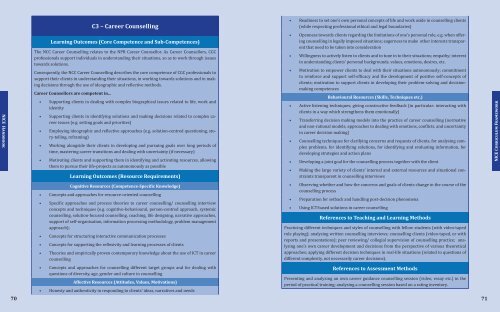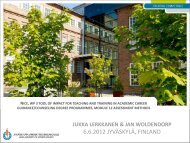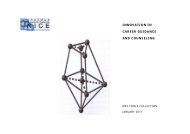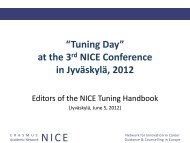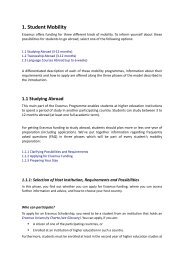NICE HANDBOOK â Academic training of Career ... - Nice-network.eu
NICE HANDBOOK â Academic training of Career ... - Nice-network.eu
NICE HANDBOOK â Academic training of Career ... - Nice-network.eu
Create successful ePaper yourself
Turn your PDF publications into a flip-book with our unique Google optimized e-Paper software.
<strong>NICE</strong> HandbookC3 – <strong>Career</strong> CounsellingLearning Outcomes (Core Competence and Sub-Competences)The NCC <strong>Career</strong> Counselling relates to the NPR <strong>Career</strong> Counsellor. As <strong>Career</strong> Counsellors, CGCpr<strong>of</strong>essionals support individuals in understanding their situations, so as to work through issuestowards solutions.Consequently, the NCC <strong>Career</strong> Counselling describes the core competence <strong>of</strong> CGC pr<strong>of</strong>essionals tosupport their clients in understanding their situations, in working towards solutions and in makingdecisions through the use <strong>of</strong> ideographic and reflective methods.<strong>Career</strong> Counsellors are competent in...◆◆◆◆◆◆◆◆◆◆◆◆◆◆◆◆◆◆◆◆◆◆◆◆Supporting clients in dealing with complex biographical issues related to life, work andidentitySupporting clients in identifying solutions and making decisions related to complex careerissues (e.g. setting goals and priorities)Employing ideographic and reflective approaches (e.g. solution-centred questioning, story-telling,reframing)Working alongside their clients in developing and pursuing goals over long periods <strong>of</strong>time, mastering career transitions and dealing with uncertainty (if necessary)Motivating clients and supporting them in identifying and activating resources, allowingthem to pursue their life-projects as autonomously as possibleLearning Outcomes (Resource Requirements)Cognitive Resources (Competence-Specific Knowledge)Concepts and approaches for resource-oriented counsellingSpecific approaches and process theories to career counselling/ counselling interviewconcepts and techniques (e.g. cognitive-behavioural, person-centred approach, systemiccounselling, solution-focused counselling, coaching, life designing, narrative approaches,support <strong>of</strong> self-organisation, information processing methodology, problem managementapproach);Concepts for structuring interactive communication processesConcepts for supporting the reflexivity and learning processes <strong>of</strong> clientsTheories and empirically proven contemporary knowledge about the use <strong>of</strong> ICT in careercounsellingConcepts and approaches for counselling different target groups and for dealing withquestions <strong>of</strong> diversity, age, gender and culture in counsellingAffective Resources (Attitudes, Values, Motivations)Honesty and authenticity in responding to clients’ ideas, narratives and needs70 71◆◆◆◆◆◆◆◆◆◆◆◆◆◆◆◆◆◆◆◆◆◆◆◆Readiness to set one’s own personal concepts <strong>of</strong> life and work aside in counselling clients(while respecting pr<strong>of</strong>essional ethical and legal boundaries)Openness towards clients regarding the limitations <strong>of</strong> one’s personal role, e.g. when <strong>of</strong>feringcounselling in legally imposed situations; eagerness to make other interests transparentthat need to be taken into considerationWillingness to actively listen to clients and to tune in to their situations; empathy; interestin understanding clients’ personal backgrounds, values, emotions, desires, etc.Motivation to empower clients to deal with their situations autonomously; commitmentto reinforce and support self-efficacy and the development <strong>of</strong> positive self-concepts <strong>of</strong>clients; motivation to support clients in developing their problem-solving and decisionmakingcompetencesBehavioural Resources (Skills, Techniques etc.)Active listening techniques; giving constructive feedback (in particular: interacting withclients in a way which strengthens them emotionally)Transferring decision making models into the practice <strong>of</strong> career counselling (normativeand non-rational models; approaches to dealing with emotions, conflicts, and uncertaintyin career decision making)Counselling techniques for clarifying concerns and requests <strong>of</strong> clients, for analysing complexproblems, for identifying solutions, for identifying and evaluating information, fordeveloping strategies and action plansDeveloping a joint goal for the counselling process together with the clientMaking the large variety <strong>of</strong> clients’ internal and external resources and situational constraintstransparent in counselling interviewsObserving whether and how the concerns and goals <strong>of</strong> clients change in the course <strong>of</strong> thecounselling processPreparation for setback and handling post-decision phenomenaUsing ICT-based solutions in career counsellingReferences to Teaching and Learning MethodsPracticing different techniques and styles <strong>of</strong> counselling with fellow students (with video-tapedrole playing); analysing written counselling interviews; counselling clients (video-taped, or withreports and presentations); peer reviewing/ collegial supervision <strong>of</strong> counselling practice; analysingone’s own career development and decisions from the perspective <strong>of</strong> various theoreticalapproaches; applying different decision techniques in real-life situations (related to questions <strong>of</strong>different complexity, not necessarily career decisions).References to Assessment MethodsPresenting and analyzing an own career guidance counselling session (video, essay etc.) in theperiod <strong>of</strong> practical <strong>training</strong>; analysing a counselling session based on a rating inventory.<strong>NICE</strong> Curriculum Framework


